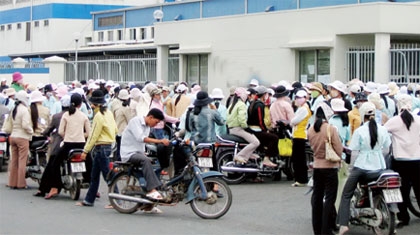Economy pushes workers to strike out

Minister of Planning and Investment Bui Quang Vinh told VIR now was the time for enterprises to give more incentives to workers and shun potential strikes.
“Strikes are often seen in enterprises offering low salaries and allowances, especially amid many enterprises trying to cut production costs,” Vinh said.
On July 20, nearly 1,000 workers from Taiwanese-backed footwear maker Cu Bach Company in northern Haiphong port city launched a strike demanding a pay rise and removal of severe working conditions. After the strike, the company’s leaders vowed to meet the workers’ demand.
In another case, hundreds of workers from British-backed jewellery presentation box maker Hanoi International Packaging Corporation in Hanoi’s Ha Dong town launched a two-day strike in mid-July. The strike came after one female worker fell ill, but the company’s leaders did not allow a rest. Also workers enjoyed no allowances and meager salaries.
Also, on June 7 workers fromCanon Vietnam Company in Hanoi’s Thang Long Industrial Park demanded a bigger pay rise and a reduction in working hours. As a result, workers’ some requirements were met, with the monthly salary raised from VND2.45 million ($117.7) to VND2.7 million ($129.8) and allowance tripled from VND50,000 ($2.4) per month.
On June 6, hundreds of workers from Vietnam-Britain Dacotex Garment Export factory in central Quang Nam province’s Chu Lai Economic Zone went on strike to protest the factory’s salary reductions. Meanwhile, workers had to work overtime with low salary and without social insurance packages.
“Strikes can happen at any time, especially at a time enterprises are trying to pare down operational costs and workers’ allowances,” said Quach Thi Nhung, head of South Korean-backed garment maker K.J Vina company’s Human Resources Division. “K.J Vina has had to raise allowances and salaries for workers,” she told VIR.
She said in Binh Duong, a hotspot for strikes, if workers saw others going on strike, they would launch copy cat strikes, though they had inked labour contracts.
According to Ho Chi Minh City Department of Labour, Invalids and Social Affairs, the city witnessed 45 strikes during this year’s first five months involving over 25,000 workers. Some 32 strikes were in such labour intensive sectors as garments and textiles, footwear and wood processing mostly in South Korea and Taiwan - invested firms.
The Ministry of Labour, Invalids and Social Affairs reported that this year’s first five months saw 228 strikes in 25 cities and provinces nationwide, down nearly 5 per cent against 2011’s first half.
What the stars mean:
★ Poor ★ ★ Promising ★★★ Good ★★★★ Very good ★★★★★ Exceptional
Related Contents
Latest News
More News
- Hermes joins Long Thanh cargo terminal development (February 04, 2026 | 15:59)
- SCG enhances production and distribution in Vietnam (February 04, 2026 | 08:00)
- UNIVACCO strengthens Asia expansion with Vietnam facility (February 03, 2026 | 08:00)
- Cai Mep Ha Port project wins approval with $1.95bn investment (February 02, 2026 | 16:17)
- Repositioning Vietnam in Asia’s manufacturing race (February 02, 2026 | 16:00)
- Manufacturing growth remains solid in early 2026 (February 02, 2026 | 15:28)
- Navigating venture capital trends across the continent (February 02, 2026 | 14:00)
- Motivations to achieve high growth (February 02, 2026 | 11:00)
- Capacity and regulations among British areas of expertise in IFCs (February 02, 2026 | 09:09)
- Transition underway in German investment across Vietnam (February 02, 2026 | 08:00)

 Tag:
Tag:




















 Mobile Version
Mobile Version